- Home
- H. P. Lovecraft
[1935] The Shadow Out of Time Page 8
[1935] The Shadow Out of Time Read online
Page 8
I shook violently, and felt a curious surge of retarding weakness, as I steered a hurried and reluctant course through the crypt of one of those great windowless, ruined towers whose alien, basalt masonry bespoke a whispered and horrible origin.
This primal vault was round and fully two hundred feet across, with nothing carved upon the dark-hued stonework. The floor was here free from anything save dust and sand, and I could see the apertures leading upward and downward. There were no stairs or inclines — indeed, my dreams had pictured those elder towers as wholly untouched by the fabulous Great Race. Those who had built them had not needed stairs or inclines.
In the dreams, the downward aperture had been tightly sealed and nervously guarded. Now it lay open-black and yawning, and giving forth a current of cool, damp air. Of what limitless caverns of eternal night might brood below, I would not permit myself to think.
Later, clawing my way along a badly heaped section of the corridor, I reached a place where the roof had wholly caved in. The debris rose like a mountain, and I climbed up over it, passing through a vast, empty space where my torchlight could reveal neither walls nor vaulting. This, I reflected, must be the cellar of the house of the metal-purveyors, fronting on the third square not far from the archives. What had happened to it I could not conjecture.
I found the corridor again beyond the mountain of detritus and stone, but after a short distance encountered a wholly choked place where the fallen vaulting almost touched the perilously sagging ceiling. How I managed to wrench and tear aside enough blocks to afford a passage, and how I dared disturb the tightly packed fragments when the least shift of equilibrium might have brought down all the tons of superincumbent masonry to crush me to nothingness, I do not know.
It was sheer madness that impelled and guided me — if, indeed, my whole underground adventure was not — as I hope — a hellish delusion or phase of dreaming. But I did make — or dream that I made — a passage that I could squirm through. As I wiggled over the mound of debris — my torch, switched continuously on, thrust deeply in my mouth — I felt myself torn by the fantastic stalactites of the jagged floor above me.
I was now close to the great underground archival structure which seemed to form my goal. Sliding and clambering down the farther side of the barrier, and picking my way along the remaining stretch of corridor with hand-held, intermittently flashing torch, I came at last to a low, circular crypt with arches — still in a marvelous state of preservation — opening off on every side.
The walls, or such parts of them as lay within reach of my torchlight, were densely hieroglyphed and chiselled with typical curvilinear symbols — some added since the period of my dreams.
This, I realised, was my fated destination, and I turned at once through a familiar archway on my left. That I could find a clear passage up and down the incline to all the surviving levels, I had, oddly, little doubt. This vast, earth-protected pile, housing the annals of all the solar system, had been built with supernal skill and strength to last as long as that system itself.
Blocks of stupendous size, poised with mathematical genius and bound with cements of incredible toughness, had combined to form a mass as firm as the planet’s rocky core. Here, after ages more prodigious than I could sanely grasp, its buried bulk stood in all its essential contours, the vast, dust-drifted floors scarce sprinkled with the litter elsewhere so dominant.
The relatively easy walking from this point onward went curiously to my head. All the frantic eagerness hitherto frustrated by obstacles now took itself out in a kind of febrile speed, and I literally raced along the low-roofed, monstrously well-remembered aisles beyond the archway.
I was past being astonished by the familiarity of what I saw. On every hand the great hieroglyphed metal shelf-doors loomed monstrously; some yet in place, others sprung open, and still others bent and buckled under bygone geological stresses not quite strong enough to shatter the titan masonry.
Here and there a dust-covered heap beneath a gaping, empty shelf seemed to indicate where cases had been shaken down by earth tremors. On occasional pillars were great symbols or letters proclaiming classes and subclasses of volumes.
Once I paused before an open vault where I saw some of the accustomed metal cases still in position amidst the omnipresent gritty dust. Reaching up, I dislodged one of the thinner specimens with some difficulty, and rested it on the floor for inspection. It was titled in the prevailing curvilinear hieroglyphs, though something in the arrangement of the characters seemed subtly unusual.
The odd mechanism of the hooked fastener was perfectly well known to me, and I snapped up the still rustless and workable lid and drew out the book within. The latter, as expected, was some twenty by fifteen inches in area, and two inches thick; the thin metal covers opening at the top.
Its tough cellulose pages seemed unaffected by the myriad cycles of time they had lived through, and I studied the queerly pigmented, brush-drawn letters of the text-symbols unlike either the usual curved hieroglyphs or any alphabet known to human scholarship — with a haunting, half-aroused memory.
It came to me that this was the language used by a captive mind I had known slightly in my dreams — a mind from a large asteroid on which had survived much of the archaic life and lore of the primal planet whereof it formed a fragment. At the same time I recalled that this level of the archives was devoted to volumes dealing with the non-terrestrial planets.
As I ceased poring over this incredible document I saw that the light of my torch was beginning to fail, hence quickly inserted the extra battery I always had with me. Then, armed with the stronger radiance, I resumed my feverish racing through unending tangles of aisles and corridors — recognising now and then some familiar shelf, and vaguely annoyed by the acoustic conditions which made my footfalls echo incongruously in these catacombs.
The very prints of my shoes behind me in the millennially untrodden dust made me shudder. Never before, if my mad dreams held anything of truth, had human feet pressed upon those immemorial pavements.
Of the particular goal of my insane racing, my conscious mind held no hint. There was, however, some force of evil potency pulling at my dazed will and buried recollection, so that I vaguely felt I was not running at random.
I came to a downward incline and followed it to profounder depths. Floors flashed by me as I raced, but I did not pause to explore them. In my whirling brain there had begun to beat a certain rhythm which set my right hand twitching in unison. I wanted to unlock something, and felt that I knew all the intricate twists and pressures needed to do it. It would be like a modern safe with a combination lock.
Dream or not, I had once known and still knew. How any dream — or scrap of unconsciously absorbed legend — could have taught me a detail so minute, so intricate, and so complex, I did not attempt to explain to myself. I was beyond all coherent thought. For was not this whole experience — this shocking familiarity with a set of unknown ruins, and this monstrously exact identity of everything before me with what only dreams and scraps of myth could have suggested — a horror beyond all reason?
Probably it was my basic conviction then — as it is now during my saner moments — that I was not awake at all, and that the entire buried city was a fragment of febrile hallucination.
Eventually, I reached the lowest level and struck off to the right of the incline. For some shadowy reason I tried to soften my steps, even though I lost speed thereby. There was a space I was afraid to cross on this last, deeply buried floor.
As I drew near it I recalled what thing in that space I feared. It was merely one of the metal-barred and closely guarded trap-doors. There would be no guards now, and on that account I trembled and tiptoed as I had done in passing through that black basalt vault where a similar trap-door had yawned.
I felt a current of cool, damp air as I had felt there, and wished that my course led in another direction. Why I had to take the particular course I was taking, I did not know.
When I
came to the space I saw that the trap-door yawned widely open. Ahead, the shelves began again, and I glimpsed on the floor before one of them a heap very thinly covered with dust, where a number of cases had recently fallen. At the same moment a fresh wave of panic clutched me, though for some time I could not discover why.
Heaps of fallen cases were not uncommon, for all through the aeons this lightless labyrinth had been racked by the heavings of earth and had echoed at intervals of the deafening clatter of toppling objects. It was only when I was nearly across the space that I realized why I shook so violently.
Not the heap, but something about the dust of the level floor was troubling me. In the light of my torch it seemed as if that dust were not as even as it ought to be — there were places where it looked thinner, as if it had been disturbed not many months before. I could not be sure, for even the apparently thinner places were dusty enough; yet a certain suspicion of regularity in the fancied unevenness was highly disquieting.
When I brought the torchlight close to one of the queer places I did not like what I saw — for the illusion of regularity became very great. It was as if there were regular lines of composite impressions — impressions that went in threes, each slightly over a foot square, and consisting of five nearly circular three-inch prints, one in advance of the other four.
These possible lines of foot-square impressions appeared to lead in two directions, as if something had gone somewhere and returned. They were, of course, very faint, and may have been illusions or accidents; but there was an element of dim, fumbling terror about the way I thought they ran. For at one end of them was the heap of cases which must have clattered down not long before, while at the other end was the ominous trap-door with the cool, damp wind, yawning unguarded down to abysses past imagination.
Chapter 8
That my strange sense of compulsion was deep and overwhelming is shewn by its conquest of my fear. No rational motive could have drawn me on after that hideous suspicion of prints and the creeping dream-memories it excited. Yet my right hand, even as it shook with fright, still twitched rhythmically in its eagerness to turn a lock it hoped to find. Before I knew it I was past the heap of lately fallen cases and running on tiptoe through aisles of utterly unbroken dust toward a point which I seemed to know morbidly, horribly well.
My mind was asking itself questions whose origin and relevancy I was only beginning to guess. Would the shelf be reachable by a human body? Could my human hand master all the aeon-remembered motions of the lock? Would the lock be undamaged and workable? And what would I do — what dare I do with what — as I now commenced to realise — I both hoped and feared to find? Would it prove the awesome, brain-shattering truth of something past normal conception, or shew only that I was dreaming?
The next I knew I had ceased my tiptoed racing and was standing still, staring at a row of maddeningly familiar hieroglyphed shelves. They were in a state of almost perfect preservation, and only three of the doors in this vicinity had sprung open.
My feelings toward these shelves cannot be described — so utter and insistent was the sense of old acquaintance. I was looking high up at a row near the top and wholly out of my reach, and wondering how I could climb to best advantage. An open door four rows from the bottom would help, and the locks of the closed doors formed possible holds for hands and feet. I would grip the torch between my teeth, as I had in other places where both hands were needed. Above all I must make no noise.
How to get down what I wished to remove would be difficult, but I could probably hook its movable fastener in my coat collar and carry it like a knapsack. Again I wondered whether the lock would be undamaged. That I could repeat each familiar motion I had not the least doubt. But I hoped the thing would not scrape or creak — and that my hand could work it properly.
Even as I thought these things I had taken the torch in my mouth and begun to climb. The projecting locks were poor supports; but, as I had expected, the opened shelf helped greatly. I used both the swinging door and the edge of the aperture itself in my ascent, and managed to avoid any loud creaking.
Balanced on the upper edge of the door, and leaning far to my right, I could just reach the lock I sought. My fingers, half numb from climbing, were very clumsy at first; but I soon saw that they were anatomically adequate. And the memory-rhythm was strong in them.
Out of unknown gulfs of time the intricate, secret motions had somehow reached my brain correctly in every detail — for after less than five minutes of trying there came a click whose familiarity was all the more startling because I had not consciously anticipated it. In another instant the metal door was slowly swinging open with only the faintest grating sound.
Dazedly I looked over the row of greyish case ends thus exposed, and felt a tremendous surge of some wholly inexplicable emotion. Just within reach of my right hand was a case whose curving hieroglyphs made me shake with a pang infinitely more complex than one of mere fright. Still shaking, I managed to dislodge it amidst a shower of gritty flakes, and ease it over toward myself without any violent noise.
Like the other case I had handled, it was slightly more than twenty by fifteen inches in size, with curved mathematical designs in low relief. In thickness it just exceeded three inches.
Crudely wedging it between myself and the surface I was climbing, I fumbled with the fastener and finally got the hook free. Lifting the cover, I shifted the heavy object to my back, and let the hook catch hold of my collar. Hands now free, I awkwardly clambered down to the dusty floor, and prepared to inspect my prize.
Kneeling in the gritty dust, I swung the case around and rested it in front of me. My hands shook, and I dreaded to draw out the book within almost as much as I longed — and felt compelled — to do so. It had very gradually become clear to me what I ought to find, and this realisation nearly paralysed my faculties.
If the thing were there — and if I were not dreaming — the implications would be quite beyond the power of the human spirit to bear. What tormented me most was my momentary inability to feel that my surroundings were a dream. The sense of reality was hideous — and again becomes so as I recall the scene.
At length I tremblingly pulled the book from its container and stared fascinatedly at the well-known hieroglyphs on the cover. It seemed to be in prime condition, and the curvilinear letters of the title held me in almost as hypnotised a state as if I could read them. Indeed, I cannot swear that I did not actually read them in some transient and terrible access of abnormal memory.
I do not know how long it was before I dared to lift that thin metal cover. I temporized and made excuses to myself. I took the torch from my mouth and shut it off to save the battery. Then, in the dark, I collected my courage finally lifting the cover without turning on the light. Last of all, I did indeed flash the torch upon the exposed page — steeling myself in advance to suppress any sound no matter what I should find.
I looked for an instant, then collapsed. Clenching my teeth, however, I kept silent. I sank wholly to the floor and put a hand to my forehead amidst the engulfing blackness. What I dreaded and expected was there. Either I was dreaming, or time and space had become a mockery.
I must be dreaming — but I would test the horror by carrying this thing back and shewing it to my son if it were indeed a reality. My head swam frightfully, even though there were no visible objects in the unbroken gloom to swirl about me. Ideas and images of the starkest terror — excited by vistas which my glimpse had opened up — began to throng in upon me and cloud my senses.
I thought of those possible prints in the dust, and trembled at the sound of my own breathing as I did so. Once again I flashed on the light and looked at the page as a serpent’s victim may look at his destroyer’s eyes and fangs.
Then, with clumsy fingers, in the dark, I closed the book, put it in its container, and snapped the lid and the curious, hooked fastener. This was what I must carry back to the outer world if it truly existed — if the whole abyss truly existed — if I, a
nd the world itself, truly existed.
Just when I tottered to my feet and commenced my return I cannot be certain. It comes to me oddly — as a measure of my sense of separation from the normal world — that I did not even once look at my watch during those hideous hours underground.
Torch in hand, and with the ominous case under one arm, I eventually found myself tiptoeing in a kind of silent panic past the draught-giving abyss and those lurking suggestions of prints. I lessened my precautions as I climbed up the endless inclines, but could not shake off a shadow of apprehension which I had not felt on the downward journey.
I dreaded having to repass through the black basalt crypt that was older than the city itself, where cold draughts welled up from unguarded depths. I thought of that which the Great Race had feared, and of what might still be lurking — be it ever so weak and dying — down there. I thought of those five-circle prints and of what my dreams had told me of such prints — and of strange winds and whistling noises associated with them. And I thought of the tales of the modern blackfellows, wherein the horror of great winds and nameless subterrene ruins was dwelt upon.
I knew from a carven wall symbol the right floor to enter, and came at last after passing that other book I had examined — to the great circular space with the branching archways. On my right, and at once recognisable, was the arch through which I had arrived. This I now entered, conscious that the rest of my course would be harder because of the tumbled state of the masonry outside the archive building. My new metal-cased burden weighed upon me, and I found it harder and harder to be quiet as I stumbled among debris and fragments of every sort.
Then I came to the ceiling-high mound of debris through which I had wrenched a scanty passage. My dread at wriggling through again was infinite, for my first passage had made some noise, and I now — after seeing those possible prints — dreaded sound above all things. The case, too, doubled the problem of traversing the narrow crevice.

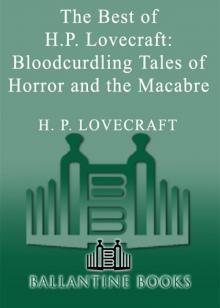 The Best of H.P. Lovecraft
The Best of H.P. Lovecraft The Definitive H.P. Lovecraft: 67 Tales Of Horror In One Volume
The Definitive H.P. Lovecraft: 67 Tales Of Horror In One Volume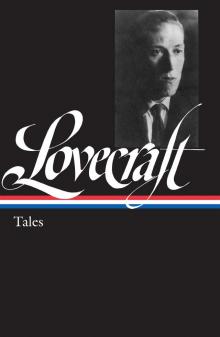 The Complete Works of H.P. Lovecraft
The Complete Works of H.P. Lovecraft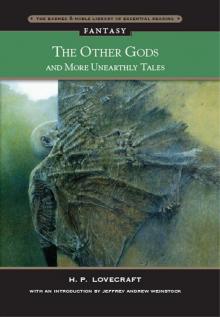 Other Gods and More Unearthly Tales
Other Gods and More Unearthly Tales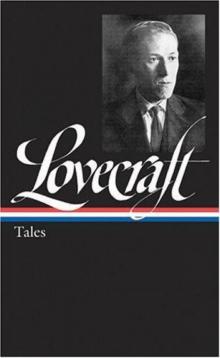 Lovecraft's Fiction Volume I, 1905-1925
Lovecraft's Fiction Volume I, 1905-1925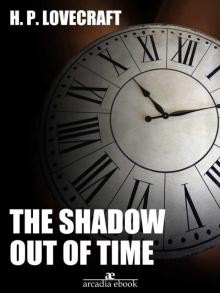 The Shadow Out of Time
The Shadow Out of Time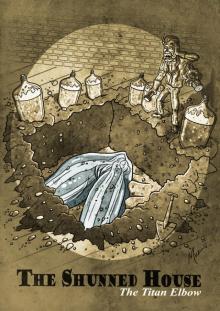 The Shunned House
The Shunned House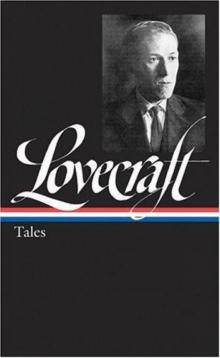 Lovecraft's Fiction Volume II, 1926-1928
Lovecraft's Fiction Volume II, 1926-1928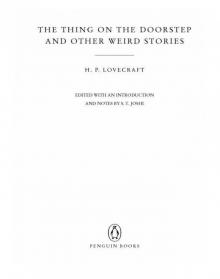 The Thing on the Doorstep and Other Weird Stories
The Thing on the Doorstep and Other Weird Stories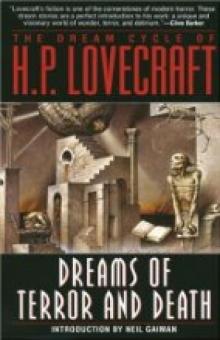 Dream Cycle of H. P. Lovecraft: Dreams of Terror and Death
Dream Cycle of H. P. Lovecraft: Dreams of Terror and Death Great Tales of Horror
Great Tales of Horror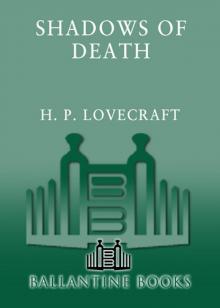 Shadows of Death
Shadows of Death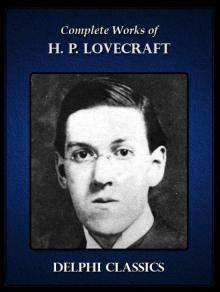 Delphi Complete Works of H. P. Lovecraft (Illustrated)
Delphi Complete Works of H. P. Lovecraft (Illustrated)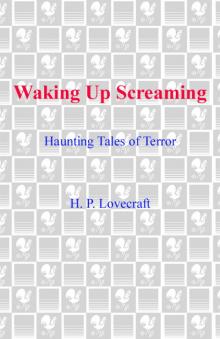 Waking Up Screaming: Haunting Tales of Terror
Waking Up Screaming: Haunting Tales of Terror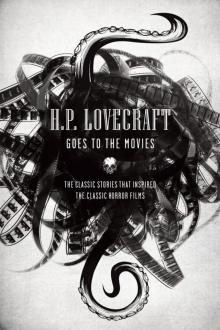 H.P. Lovecraft Goes to the Movies
H.P. Lovecraft Goes to the Movies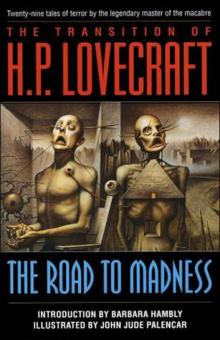 The Road to Madness
The Road to Madness The Complete H.P. Lovecraft Reader (68 Stories)
The Complete H.P. Lovecraft Reader (68 Stories)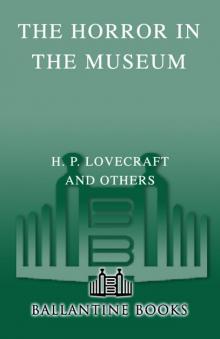 The Horror in the Museum
The Horror in the Museum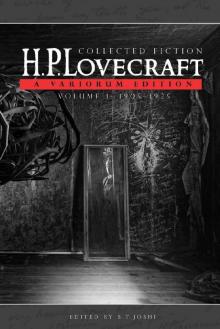 Collected Fiction Volume 1 (1905-1925): A Variorum Edition
Collected Fiction Volume 1 (1905-1925): A Variorum Edition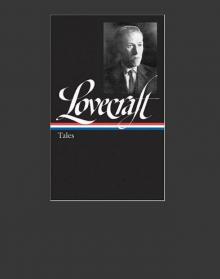 Lovecrafts_Fiction, vol.I_1905-1925
Lovecrafts_Fiction, vol.I_1905-1925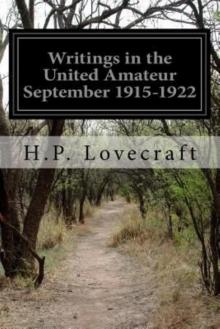 Writings in the United Amateur, 1915-1922
Writings in the United Amateur, 1915-1922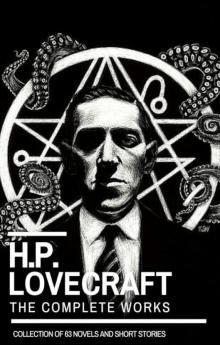 H.P. Lovecraft: The Complete Works
H.P. Lovecraft: The Complete Works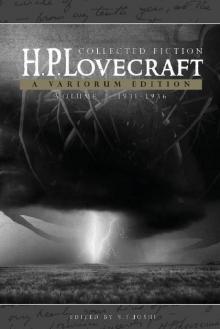 Collected Fiction Volume 3 (1931-1936): A Variorum Edition
Collected Fiction Volume 3 (1931-1936): A Variorum Edition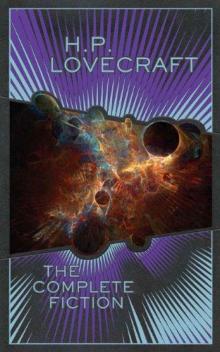 H.P. Lovecraft: The Complete Fiction
H.P. Lovecraft: The Complete Fiction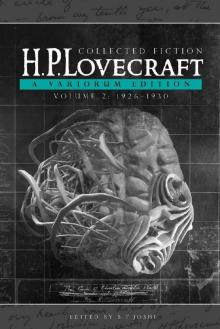 Collected Fiction Volume 2 (1926-1930): A Variorum Edition
Collected Fiction Volume 2 (1926-1930): A Variorum Edition Yog Sothothery - The Definitive H.P. Lovecraft Anthology
Yog Sothothery - The Definitive H.P. Lovecraft Anthology The Complete H.P. Lovecraft Collection (Xist Classics)
The Complete H.P. Lovecraft Collection (Xist Classics)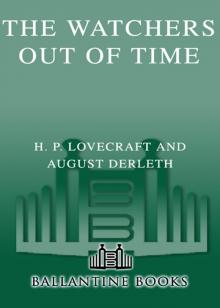 The Watchers Out of Time
The Watchers Out of Time Eldritch Tales
Eldritch Tales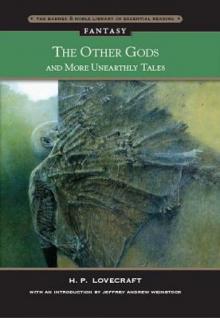 The Other Gods And More Unearthly Tales
The Other Gods And More Unearthly Tales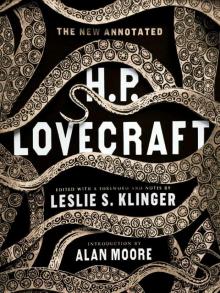 The New Annotated H. P. Lovecraft
The New Annotated H. P. Lovecraft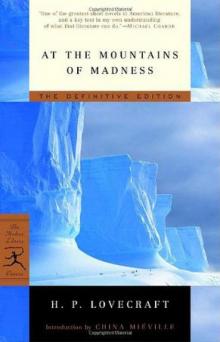 At the mountains of madness
At the mountains of madness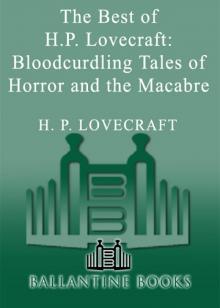 Bloodcurdling Tales of Horror and the Macabre
Bloodcurdling Tales of Horror and the Macabre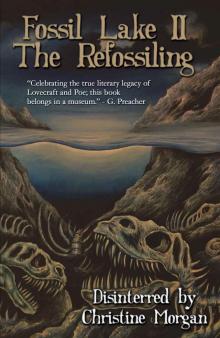 Fossil Lake II: The Refossiling
Fossil Lake II: The Refossiling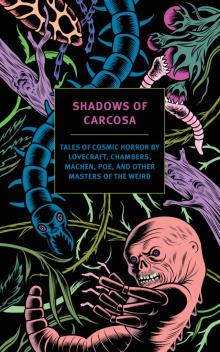 Shadows of Carcosa: Tales of Cosmic Horror by Lovecraft, Chambers, Machen, Poe, and Other Masters of the Weird
Shadows of Carcosa: Tales of Cosmic Horror by Lovecraft, Chambers, Machen, Poe, and Other Masters of the Weird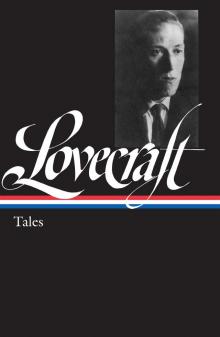 H. P. Lovecraft
H. P. Lovecraft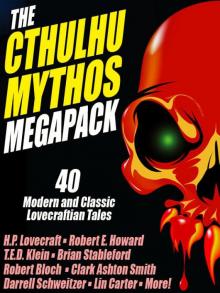 The Cthulhu Mythos Megapack
The Cthulhu Mythos Megapack The Complete H. P. Lovecraft Reader (2nd Edition)
The Complete H. P. Lovecraft Reader (2nd Edition)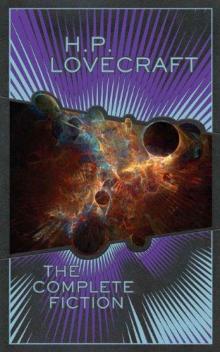 The Complete Fiction
The Complete Fiction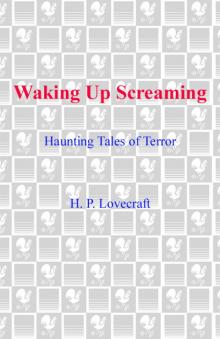 Waking Up Screaming
Waking Up Screaming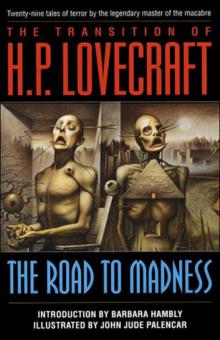 Transition of H. P. Lovecraft
Transition of H. P. Lovecraft![[1935] The Shadow Out of Time Read online](http://i1.bookreadfree.com/i2/04/12/1935_the_shadow_out_of_time_preview.jpg) [1935] The Shadow Out of Time
[1935] The Shadow Out of Time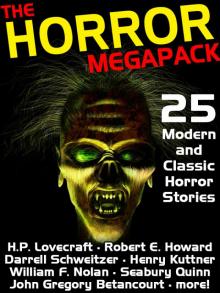 The Horror Megapack
The Horror Megapack